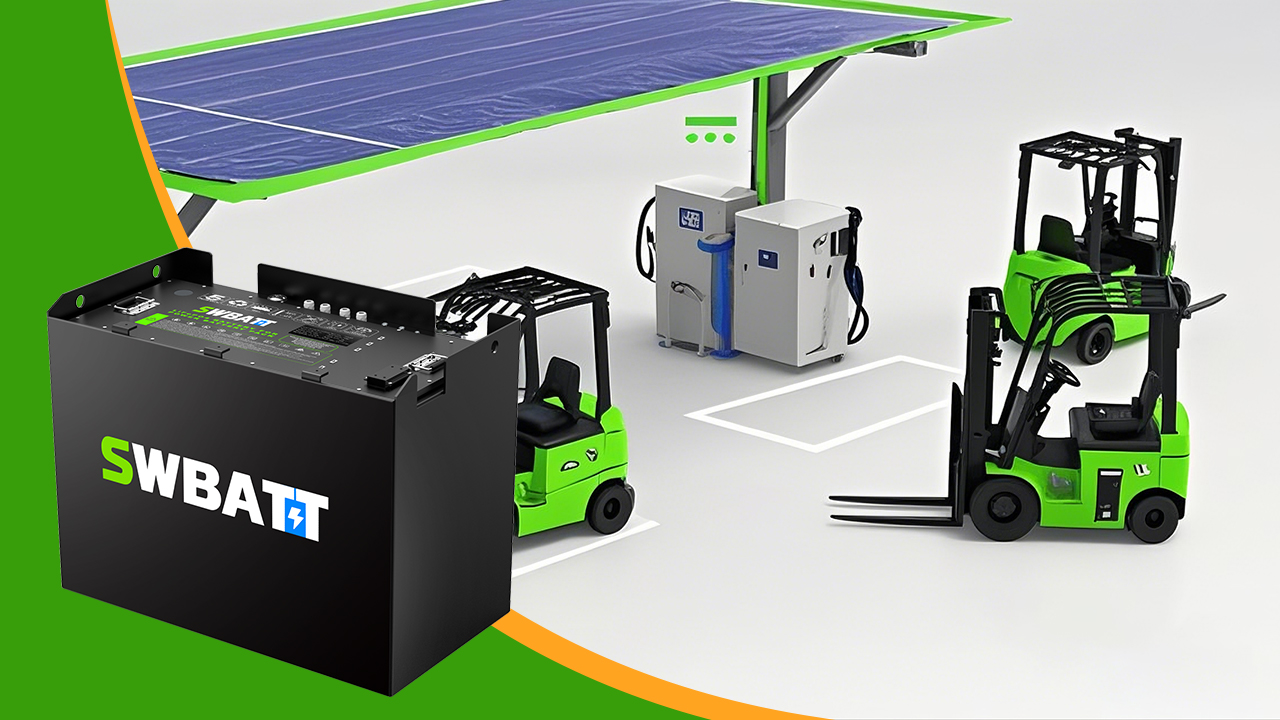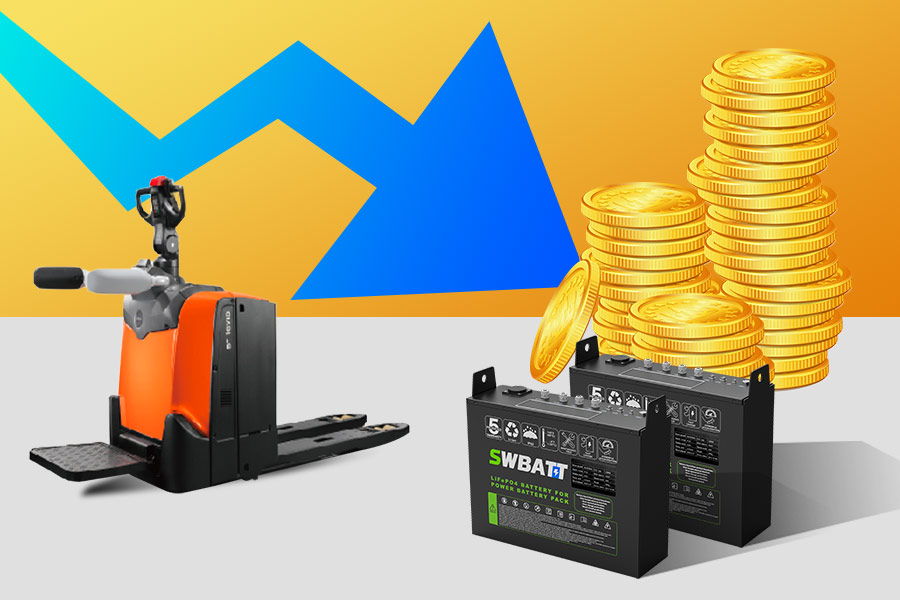The material handling industry constantly evolves, with electric forklifts increasingly crucial in efficient warehouse operations. While electric forklift trucks have offered a cleaner alternative to internal combustion engine (ICE) models for years, the real revolution is the shift to lithium-ion battery power. This article explains why lithium-ion is rapidly becoming the preferred choice for businesses seeking to optimize their powered forklift fleets and improve their bottom line.
Why Lithium-Ion Batteries are Transforming Electric Forklifts
Table of Contents
ToggleTraditional electric forktrucks powered by lead-acid batteries have inherent limitations. Lithium-ion technology directly addresses these, providing a superior power solution for a wide range of electric forklifts for sale, including those from major brands like:
- Toyota Material Handling: A global leader offering a comprehensive range of lithium-ion powered forklifts.
- KION Group (Linde, STILL): European market leaders known for ergonomic design and advanced lithium-ion solutions.
- Jungheinrich: Specialists in intralogistics, providing energy-efficient lithium-ion powered forklifts.
- Crown Equipment Corporation: Known for operator comfort and visibility, Crown Equipment Corporation offers lithium-ion options across its electric fork truck line.
- Hyster-Yale Materials Handling (Hyster & Yale): Offering robust and durable lithium-ion powered forklifts for demanding applications.
- Mitsubishi Logisnext: Offering a range of lithium-ion powered forklifts.
- BYD: A rising force in the market, focusing solely on building lithium-powered electric forklifts.
The growing number of manufacturers offering new electric forklifts for sale with lithium-ion options underscores the apparent advantages.
Choosing the right battery technology for your battery forklift fleet is crucial for operational efficiency and cost-effectiveness. Here’s a concise comparison:
Table 1: Key Differences – Lithium-Ion vs. Lead-Acid
Data Sources: Battery University (batteryuniversity.com), Material Handling & Logistics (mhlnews.com), EPA.
| Feature | Lead-Acid | Lithium-Ion |
| Energy Density | Low | High (smaller, lighter) |
| Charging Time | 8-10 hours (plus cool-down) | 1-2 hours (opportunity charging) |
| Lifespan | 1,500-2,000 cycles | 3,000-5,000+ cycles |
| Maintenance | High (watering, equalization) | Very Low |
| Efficiency | Lower | Higher |
| Voltage Drop | Significant | Minimal |
| Safety | Acid spills, hydrogen gas | Safer, minimal gas emission |
| Opportunity Charging | Not recommended | Yes |
| Initial Cost | Lower | Higher |
| TCO (Total Cost) | Higher | Lower |
Discover Advanced Lithium Battery Solutions
Explore SWBATT‘s innovative LifePO4 batteries for electric vehicles, energy storage, and more. Tailored solutions to meet your energy needs with efficiency and sustainability.
Unlocking Material Handling Efficiency with Lithium-Ion
The advantages of lithium-ion batteries in electric forklifts directly translate to improved operational efficiency:
- Maximized Uptime: Rapid charging and opportunity charging capabilities mean significantly less downtime. Forklifts spend more time working and less time charging.
- Consistent Performance: Lithium-ion batteries maintain a near-constant voltage output, ensuring consistent lifting and travel speeds throughout the shift, unlike the voltage drop experienced with lead acid.
- Reduced Labor Costs: Virtually maintenance-free operation eliminates the need for battery watering, equalization, and cleaning, freeing up valuable labor.
- Lower Energy Costs: Higher charging efficiency translates directly to lower electricity bills.
- Space Savings: The smaller size and elimination of dedicated battery rooms reclaim valuable warehouse space.
- Longer battery life: Lithium-ion batteries can be charged many times more than lead-acid batteries.
The Broader Impact on Material Handling
The adoption of lithium-ion is transforming the material handling industry:
- Sustainability: Lower energy consumption and eliminating hazardous materials contribute to a greener operation.
- Enhanced Safety: Reduced risk of acid spills and hazardous gas emissions creates a safer work environment.
- Data-Driven Optimization: Battery Management Systems (BMS) provide valuable data for optimizing forklift usage, charging schedules, and overall fleet management. This data can identify underutilized electric forklift trucks and improve overall fleet efficiency.
- Lower Total Cost of Ownership (TCO): Despite a higher initial investment, the longer lifespan, reduced maintenance, and energy savings result in a lower TCO over the life of the battery forklift.
Total Cost of Ownership (TCO) – A Clear Advantage
While the upfront cost of a lithium-ion battery is higher, the long-term savings are substantial. Let’s examine a simplified 5-year TCO analysis for a typical electric fork truck:
Table 2: Simplified 5-Year TCO Comparison
| Cost Component | Lead-Acid (Estimated) | Lithium-Ion (Estimated) |
| Initial Battery Cost | $6,000 | $15,000 |
| Replacement | $6,000 (1 replacement) | $0 |
| Charging | $13,500 | $10,000 |
| Maintenance | $3,750 | $500 |
| Labor (Management) | $5,250 | $750 |
| Total 5-Year TCO | $34,500 | $26,250 |
Note, prices are only to illustrate the TCO, in reality, prices may vary. Data source are refered from previous content.
This simplified example demonstrates a significant TCO advantage for lithium-ion. The actual savings will vary based on specific usage patterns, energy costs, and labor rates, but the trend is clear: lithium-ion offers long-term cost benefits.
Frequently Asked Questions (FAQs)
Q:Can lead-acid powered forklifts be converted to lithium-ion?
A:Yes, many electric forklifts can be retrofitted. A qualified dealer can assess compatibility and provide a tailored solution.
Q:Are lithium-ion forklift batteries safe?
A:Lithium-ion batteries designed for industrial use have multiple safety features and undergo rigorous testing. They are generally safer than lead-acid batteries.
Q:What is the typical payback period for switching to lithium-ion?
A:Due to reduced energy, maintenance, and replacement costs, the payback period is typically 2-4 years and often sooner.
Conclusion
Lithium-ion battery technology is revolutionizing the electric forklift industry. The combination of increased uptime, improved performance, enhanced safety, and lower TCO makes it the clear choice for businesses seeking to optimize their material handling operations and gain a competitive edge. As the demand for electric forklifts for sale continues to grow, lithium-ion power is undoubtedly the driving force behind a more efficient and sustainable future for material handling.




